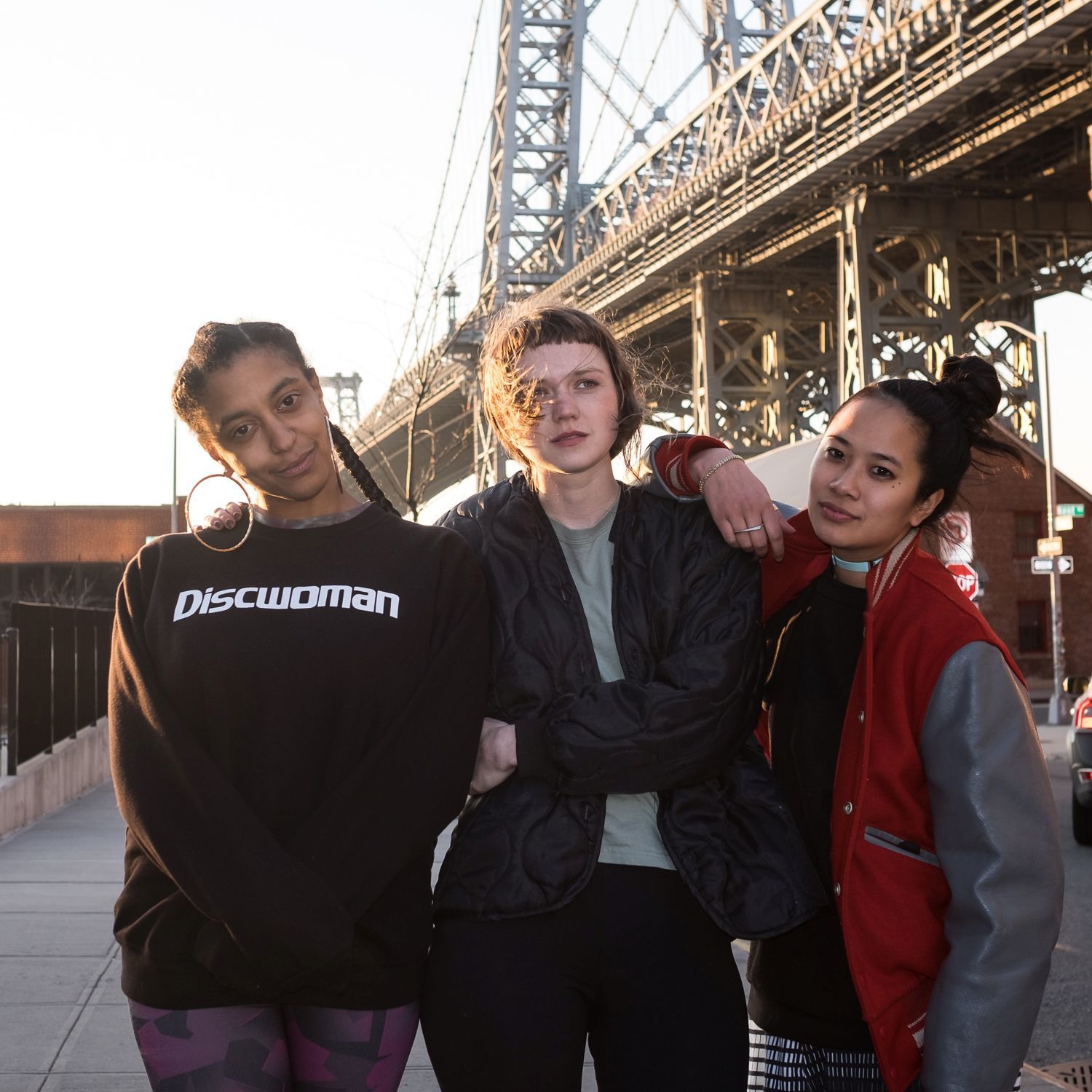Discwoman describe themselves as a “platform, collective, and booking agency — representing and showcasing cis women, trans women, and gender queer talent in electronic music.” Christine Tran, Emma Olsen and Frankie all work to their own strengths: Emma spends most of her time Djing, while Christine and Frankie take the lead with DJ bookings and organizing their seemingly global takeover. After meeting through Brooklyn’s techno scene a year and a half ago, the trio created, and have now expanded, their imprint, and in turn have made a statement against what they call the “male dominated world of dance music.” It’s a fair observation: recent stats illustrate that in 2015, only 10.8% of global electronic music festival DJs were female and only 18% of electronic labels included women on their roster.
Alongside having more diverse line-ups (which include women of color, trans, agender, and LGBT identities) the point Discwoman are making is that it’s crucial to see women in positions of structural power, as booking agents, promoters and label managers. Ahead of the release of their documentary — which excellently illustrates their world, and involves talent including Lebanese-Nigerian producer Nicole Moudaber, Sandunes, and Mexican producer Demian Licht — we speak to co-founder Frankie Hutchinson about the techno boys club and being part of a cultural shift.
Your collective has been hugely successful in a relatively short period of time. How do you make it work?
I met Emma (Umfang) at Bossa Nova Civic Club because she DJ’ed really amazing techno tracks and we connected really hard. We were both interested in creating platforms, so we were like, “We should do this!” so we booked that place at Bossa Nova. I already knew Christine and she was interested in getting involved too, so we organized it together. We have really good communication — I’m more of a dreamer and ideas person, Emma is more about the music as a DJ and Christine is so organized and great at event planning.
Was Discwoman’s formation a response to the lack of visibility of female-identified DJs on line-ups?
Yeah, it was more that we noticed that there were so many great women producers and DJs rather than feeling like we were oppressed in the dance. I mean, I don’t DJ at all, so being a person who participates in the crowd of course you notice that. More than that, you notice that there were so many women who were super-talented, so we started a booking agency. After that, the floodgates opened.
What talent would you like to champion?
The people who are on our roster! There’s Umfang who is also one of the co-founders, Volvox, and Bearcat who just did Boiler Room for us. It’s great being able to do the Lot Radio because we do a lot of events, so it’s difficult way of finding interesting way for people to engage. Radio is a really interesting way of doing that.
Does it feel like there’s a strong bro culture in the club scene in Brooklyn?
Oh, definitely. I mean, a lot of the bookers I meet are men, for one. The line-ups don’t reflect what they should reflect and their event suffers as a result, because you don’t get as a diverse a crowd in the space. Our parties are great because we reflect what we want to see. Well, that’s out goal anyway.
You’ve talked in the past about the importance of having an inclusive space for difference. What does that give to one of your club nights?
Safety, which is the most liberating thing ever. Feeling like you’re not gonna get groped. I like to think our events offer that. No-one can be fully in control of those things, but that’s what we’d like to offer because it’s not something that is everywhere. We are fully inclusive: cis women, trans women, gender queer. Discwoman is supposed to signify anyone who doesn’t profit from being a male-privilege-identified person, basically. We want to be a platform of people who just don’t think that they fit in with that.
Do you think it still feels radical when you see woman of color on a line-up?
Absolutely. Because I know what struggle it takes. The amount of lack of self-confidence I’ve had in my life just from it being drummed into my head and not thinking I’m smart, not thinking I’m beautiful. These things are still in my head, but just not as much. You haven’t always been considered desirable because you’ve grown up in a very white-centered place and they don’t think of you as being attractive. You have to learn those things and it’s hard because there’s a lot of re-learning. Everything I do feels political. Every other email I have is like, “This need to be more diverse.”
What do you listen to in your down time?
Listening to a lot of slow jamz in my down time. I like raving to techno but in my personal eardrums I like Ginuwine and Mary J Blige and 112, R Kelly. Me and Emma are obsessed with Jeff Mills. He’s our hero.
What’s your favourite moment from the documentary?
The parts where we’re talking about we each other is cute — we cried a lot. It’s amazing that it includes Demian Licht. When she talks about feminism it’s so on point.
Do you feel like there’s a cultural shift happening?
Yes, I can feel it. I was just in Montreal and a woman came up to me who was starting something and she said it was directly inspired by us. She had just thrown her first techno rave that weekend. Now I wouldn’t be worried to tell someone who took a patronizing tone with me in a studio to fuck off.
Credits
Text Kieran Yates
Photography Oliver Correa
